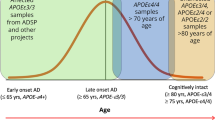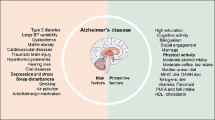Abstract
Objective
To investigate whether high serum homocysteine (Hcy) levels is associated with the risk of developing Alzheimer’s disease (AD) by performing a meta-analysis based on updated published data.
Methods
We conducted a comprehensive research using Medline (Pubmed), Scopus, Web of Science and EMBASE databases to identify all prospective studies published any time to July 7, 2020 evaluating the association between elevated Hcy levels and AD risk.
Results
From an initial screening of 269 published papers, 9 prospective investigations conducted on a total of 7474 subjects with mean follow-up of 9.5 years (range: 3.7–10) were included in the meta-analysis. Eight seventy-five of these subjects converted to AD. Hcy was significantly higher in these individuals (HRadjusted:1.48, 95% CI:1.23–1.76, I2=65.6%, p<0.0001) compared with who did not convert to AD. There was a significant publication bias (Egger’s test, t=6.39, p=0.0003) and this was overcome by the trim and fill method, which allowed to calculate a bias-corrected imputed risk estimate of HRadjusted:1.20, 95% CI:1.01–1.44, Q value=41.92.
Conclusions
The present meta-analysis found that having higher Hcy increases the risk of AD in the elderly and this finding is consistent with the widely suggested role of this non-proteinogenic α-amino acid in AD neurodegeneration.



Similar content being viewed by others
Data availability statement: Data sharing is not applicable to this article as no new data were created or analyzed in this study.
References
Ravaglia G, Forti P, Montesi F, Lucicesare A, Pisacane N, Rietti E, et al. Mild cognitive impairment: epidemiology and dementia risk in an elderly Italian population. J Am Geriatr Soc. 2008;56(1):51–8.
Villeneuve S, Jagust WJ. Imaging Vascular Disease and Amyloid in the Aging Brain: Implications for Treatment. J Prev Alzheimer’s Dis. 2015;2(1):64–70.
de la Torre JC. Is Alzheimer’s disease a neurodegenerative or a vascular disorder? Data, dogma, and dialectics. Lancet Neurol. 2004;3(3):184–90.
Iturria-Medina Y, Sotero RC, Toussaint PJ, Mateos-Pérez JM, Evans AC. Early role of vascular dysregulation on late-onset Alzheimer’s disease based on multifactorial data-driven analysis. Nat Commun. 2016;7(1):11934.
Cervellati C, Trentini A, Romani A, Bellini T, Bosi C, Ortolani B, et al. Serum paraoxonase and arylesterase activities of paraoxonase-1 (PON-1), mild cognitive impairment, and 2-year conversion to dementia: A pilot study. J Neurochem. 2015;135(2):395–401.
Hottman DA, Chernick D, Cheng S, Wang Z, Li L. HDL and cognition in neurodegenerative disorders. Neurobiol Dis. 2014;72 Pt A:22–36.
Craft S. The role of metabolic disorders in Alzheimer disease and vascular dementia: two roads converged. Arch Neurol. 2009;66(3):300–5.
Wood WG, Li L, Müller WE, Eckert GP. Cholesterol as a causative factor in Alzheimer’s disease: a debatable hypothesis. J Neurochem. 2014;129(4):559–72.
van Eersel MEA, Joosten H, Gansevoort RT, Slaets JPJ, Izaks GJ. Treatable Vascular Risk and Cognitive Performance in Persons Aged 35 Years or Older: Longitudinal Study of Six Years. J Prev Alzheimer’s Dis. 2019;6(1):42–9.
Chrysant SG, Chrysant GS. The current status of homocysteine as a risk factor for cardiovascular disease: a mini review. Expert Rev Cardiovasc Ther. 2018;16(8):559–65.
Seshadri S, Beiser A, Selhub J, Jacques PF, Rosenberg IH, D’Agostino RB, et al. Plasma Homocysteine as a Risk Factor for Dementia and Alzheimer’s Disease. N Engl J Med. 2002;346(7):476–83.
Ma F, Wu T, Zhao J, Ji L, Song A, Zhang M, et al. Plasma Homocysteine and Serum Folate and Vitamin B12 Levels in Mild Cognitive Impairment and Alzheimer’s Disease: A Case-Control Study. Nutrients. 2017;9(7):725.
Handing EP, Small BJ, Reynolds SL, Kumar NB. Impact of Dietary Factors and Inflammation on Cognition among Older Adults. J Prev Alzheimer’s Dis. 2015;2(4):220–6.
Elias MF, Sullivan LM, D’Agostino RB, Elias PK, Jacques PF, Selhub J, et al. Homocysteine and Cognitive Performance in the Framingham Offspring Study: Age Is Important. Am J Epidemiol. 2005;162(7):644–53.
McCully KS. Chemical pathology of homocysteine. IV. Excitotoxicity, oxidative stress, endothelial dysfunction, and inflammation. Ann Clin Lab Sci. 2009;39(3):219–32.
Bonetti F, Brombo G, Zuliani G. The relationship between hyperhomocysteinemia and neurodegeneration. Neurodegener Dis Manag. 2016;6(2):133–45.
Selhub J, Miller JW. The pathogenesis of homocysteinemia: interruption of the coordinate regulation by S-adenosylmethionine of the remethylation and transsulfuration of homocysteine. Am J Clin Nutr. 1992;55(1):131–8.
Froese DS, Fowler B, Baumgartner MR. Vitamin B 12, folate, and the methionine remethylation cycle-biochemistry, pathways, and regulation. J Inherit Metab Dis. 2019;42(4):673–85.
Yamada K, Kawata T, Wada M, Isshiki T, Onoda J, Kawanishi T, et al. Extremely Low Activity of Methionine Synthase in Vitamin B-12–Deficient Rats May Be Related to Effects on Coenzyme Stabilization Rather than to Changes in Coenzyme Induction. J Nutr. 2000;130(8):1894–900.
Sugasini D, Yalagala PCR, Goggin A, Tai LM, Subbaiah P V. Enrichment of brain docosahexaenoic acid (DHA) is highly dependent upon the molecular carrier of dietary DHA: lysophosphatidylcholine is more efficient than either phosphatidylcholine or triacylglycerol. J Nutr Biochem. 2019;74:108231.
Moher D, Liberati A, Tetzlaff J, Altman DG, PRISMA Group. Preferred reporting items for systematic reviews and meta-analyses: the PRISMA statement. PLoS Med. 2009;6(7):e1000097.
Hartling L, Milne A, Hamm MP, Vandermeer B, Ansari M, Tsertsvadze A, et al. Testing the Newcastle Ottawa Scale showed low reliability between individual reviewers. J Clin Epidemiol. 2013;66(9):982–93.
Chen S, Honda T, Ohara T, Hata J, Hirakawa Y, Yoshida D, et al. Serum homocysteine and risk of dementia in Japan. J Neurol Neurosurg Psychiatry. 2020;91(5):540–6.
Ravaglia G, Forti P, Maioli F, Chiappelli M, Montesi F, Tumini E, et al. Blood inflammatory markers and risk of dementia: The Conselice Study of Brain Aging. Neurobiol Aging. 2007;28(12):1810–20.
Luchsinger JA, Tang M-X, Shea S, Miller J, Green R, Mayeux R. Plasma homocysteine levels and risk of Alzheimer disease. Neurology. 2004 Jun 8;62(11):1972–6.
Ravaglia G, Forti P, Maioli F, Martelli M, Servadei L, Brunetti N, et al. Homocysteine and folate as risk factors for dementia and Alzheimer disease. Am J Clin Nutr. 2005;82(3):636–43.
Hooshmand B, Solomon A, Kareholt I, Leiviska J, Rusanen M, Ahtiluoto S, et al. Homocysteine and holotranscobalamin and the risk of Alzheimer disease: A longitudinal study. Neurology. 2010;75(16):1408–14.
Miwa K, Tanaka M, Okazaki S, Yagita Y, Sakaguchi M, Mochizuki H, et al. Increased Total Homocysteine Levels Predict the Risk of Incident Dementia Independent of Cerebral Small-Vessel Diseases and Vascular Risk Factors. J Alzheimer’s Dis. 2015;49(2):503–13.
Zylberstein DE, Lissner L, Björkelund C, Mehlig K, Thelle DS, Gustafson D, et al. Midlife homocysteine and late-life dementia in women. A prospective population study. Neurobiol Aging. 2011;32(3):380–6.
Kivipelto M, Annerbo S, Hultdin J, Bäckman L, Viitanen M, Fratiglioni L, et al. Homocysteine and holo-transcobalamin and the risk of dementia and Alzheimers disease: a prospective study. Eur J Neurol. 2009;16(7):808–13.
Smith AD, Smith SM, de Jager CA, Whitbread P, Johnston C, Agacinski G, et al. Homocysteine-lowering by B vitamins slows the rate of accelerated brain atrophy in mild cognitive impairment: a randomized controlled trial. PLoS One. 2010;5(9):e12244.
Fuso A, Nicolia V, Cavallaro RA, Ricceri L, D’Anselmi F, Coluccia P, et al. B-vitamin deprivation induces hyperhomocysteinemia and brain S-adenosylhomocysteine, depletes brain S-adenosylmethionine, and enhances PS1 and BACE expression and amyloid-β deposition in mice. Mol Cell Neurosci. 2008;37(4):731–46
Li J-G, Chu J, Barrero C, Merali S, Praticò D. Homocysteine exacerbates β-amyloid pathology, tau pathology, and cognitive deficit in a mouse model of Alzheimer disease with plaques and tangles. Ann Neurol. 2014;75(6):851–63.
Montecinos-Oliva C, Arrázola MS, Jara C, Tapia-Rojas C, Inestrosa NC. Hormetic-Like Effects of L-Homocysteine on Synaptic Structure, Function, and Aβ Aggregation. Pharmaceuticals. 2020;13(2):24.
Gu SX, Sonkar VK, Katare PB, Kumar R, Kruger WD, Arning E, et al. Memantine Protects From Exacerbation of Ischemic Stroke and Blood Brain Barrier Disruption in Mild But Not Severe Hyperhomocysteinemia. J Am Heart Assoc. 2020;9(4):e013368.
de la Torre JC. Alzheimer Disease as a Vascular Disorder. Stroke. 2002;33(4):1152–62.
Cervellati C, Wood PL, Romani A, Valacchi G, Squerzanti M, Sanz JM, et al. Oxidative challenge in Alzheimer’s disease: state of knowledge and future needs. J Investig Med. 2016;64(1):21–32.
Beard RS, Reynolds JJ, Bearden SE. Hyperhomocysteinemia increases permeability of the blood-brain barrier by NMDA receptor-dependent regulation of adherens and tight junctions. Blood. 2011;118(7):2007–14.
Cervellati C, Trentini A, Pecorelli A, Valacchi G. Inflammation in Neurological Disorders: The Thin Boundary Between Brain and Periphery. Antioxid Redox Signal. 2020;33(3):191–210.
Zhou F, Chen S. Hyperhomocysteinemia and risk of incident cognitive outcomes: An updated dose-response meta-analysis of prospective cohort studies. Ageing Res Rev. 2019;51:55–66.
Price BR, Wilcock DM, Weekman EM. Hyperhomocysteinemia as a Risk Factor for Vascular Contributions to Cognitive Impairment and Dementia. Front Aging Neurosci. 2018;10:350.
Douaud G, Refsum H, de Jager CA, Jacoby R, Nichols TE, Smith SM, et al. Preventing Alzheimer’s disease-related gray matter atrophy by B-vitamin treatment. Proc Natl Acad Sci U S A. 2013;110(23):9523–8.
Jager CA, Oulhaj A, Jacoby R, Refsum H, Smith AD. Cognitive and clinical outcomes of homocysteine-lowering B-vitamin treatment in mild cognitive impairment: a randomized controlled trial. Int J Geriatr Psychiatry. 2012;27(6):592–600.
Jernerén F, Elshorbagy AK, Oulhaj A, Smith SM, Refsum H, Smith AD. Brain atrophy in cognitively impaired elderly: the importance of long-chain ω-3 fatty acids and B vitamin status in a randomized controlled trial. Am J Clin Nutr. 2015;102(1):215–21.
Oulhaj A, Jernerén F, Refsum H, Smith AD, de Jager CA. Omega-3 Fatty Acid Status Enhances the Prevention of Cognitive Decline by B Vitamins in Mild Cognitive Impairment. J Alzheimer’s Dis. 2016;50(2):547–57.
Jernerén F, Cederholm T, Refsum H, Smith AD, Turner C, Palmblad J, et al. Homocysteine Status Modifies the Treatment Effect of Omega-3 Fatty Acids on Cognition in a Randomized Clinical Trial in Mild to Moderate Alzheimer’s Disease: The OmegAD Study. J Alzheimers Dis. 2019;69(1):189–97.
Funding
Funding information: The research reported did not receive any specific grant from funding agencies in the public, commercial, or not- for- profit sectors.
Author information
Authors and Affiliations
Corresponding author
Ethics declarations
Conflicts of interest: All authors declare that they have no conflicts of interest.
Approval by ethical committee: Not necessary (systematic review)
Electronic supplementary material
Rights and permissions
About this article
Cite this article
Zuin, M., Cervellati, C., Brombo, G. et al. Elevated Blood Homocysteine and Risk of Alzheimer’s Dementia: An Updated Systematic Review and Meta-Analysis Based on Prospective Studies. J Prev Alzheimers Dis 8, 329–334 (2021). https://doi.org/10.14283/jpad.2021.7
Received:
Accepted:
Published:
Issue Date:
DOI: https://doi.org/10.14283/jpad.2021.7




